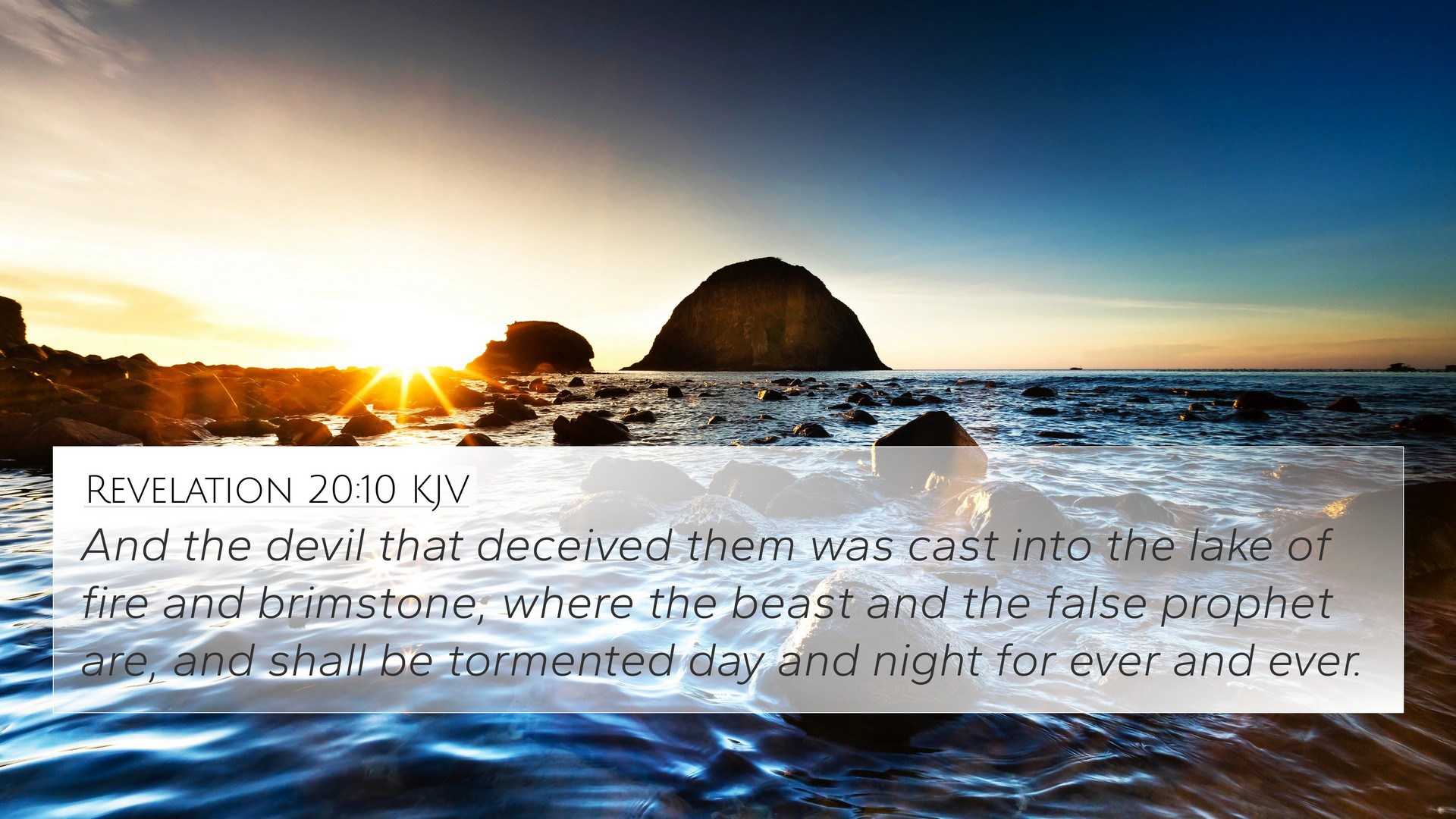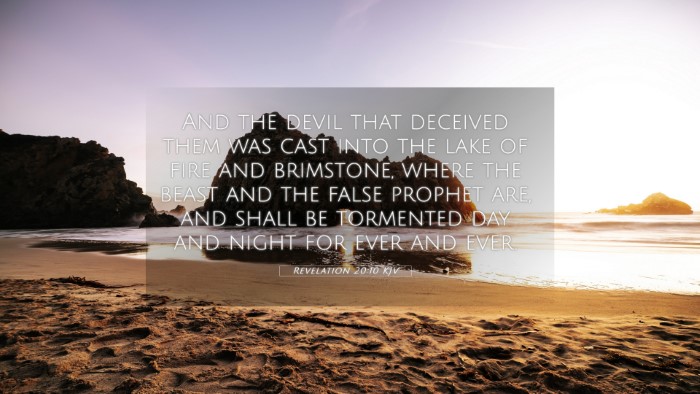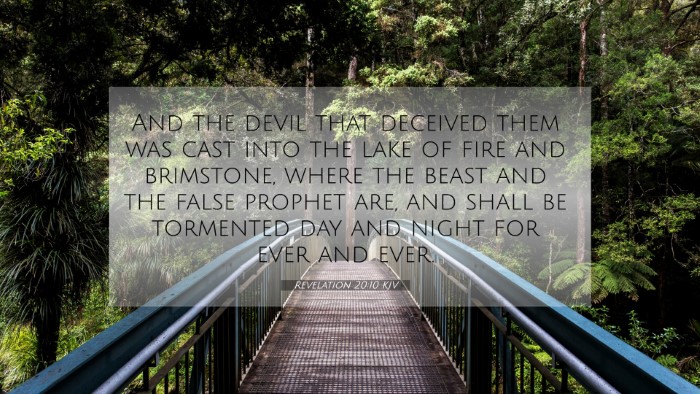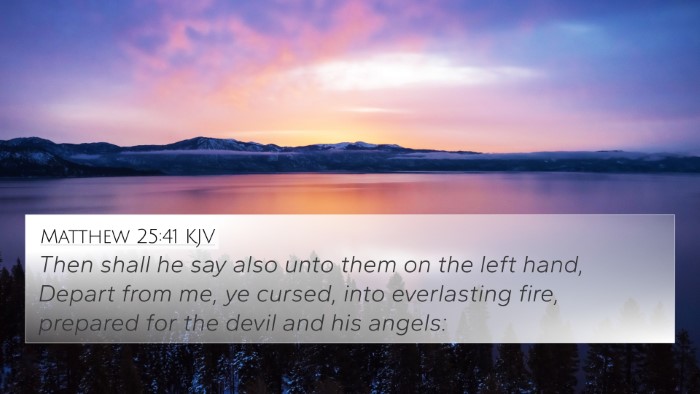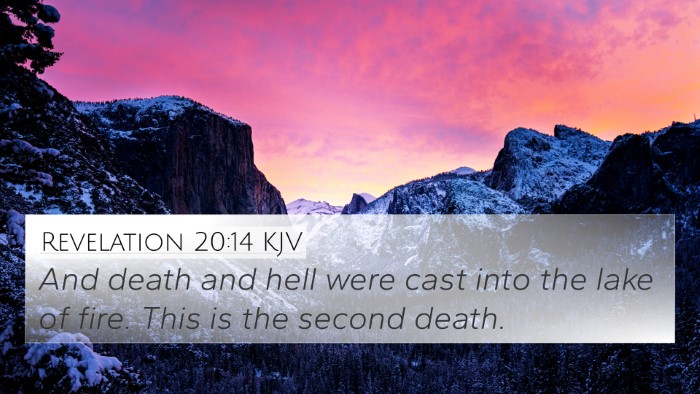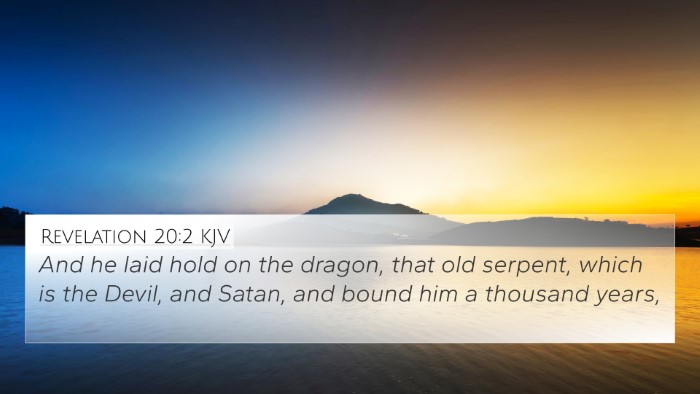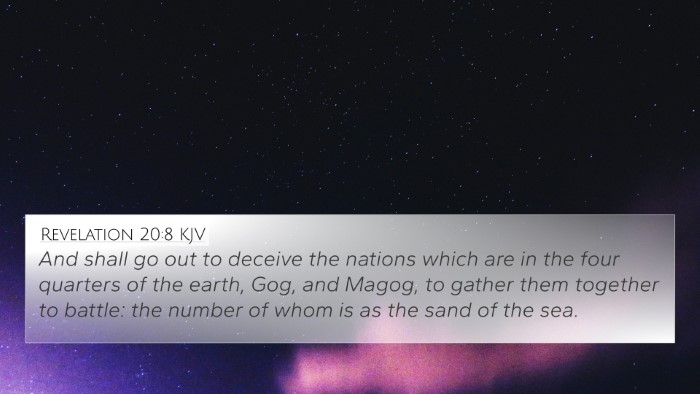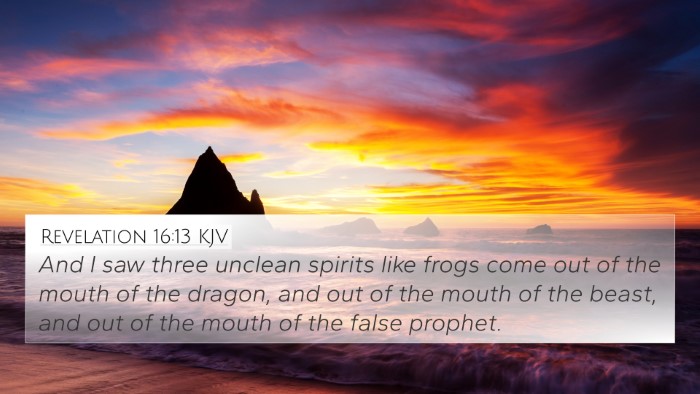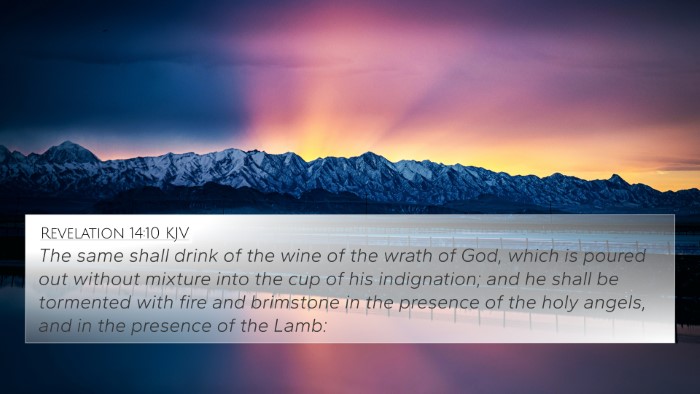Understanding Revelation 20:10
Verse Reference: Revelation 20:10 - "And the devil that deceived them was cast into the lake of fire and brimstone, where the beast and the false prophet are, and shall be tormented day and night for ever and ever."
Summarized Meanings from Public Domain Commentaries
This verse serves as a crucial moment in the eschatological narrative of the Book of Revelation, representing the ultimate fate of Satan, the deceiver. The imagery of the lake of fire conveys a sense of finality and eternal punishment, highlighting the serious consequences of rebellion against God.
Key Insights from Matthew Henry:
- Henry emphasizes the decisive defeat of evil through this act, marking the end of Satan's influence over humanity.
- He notes the eternal nature of the punishment, signifying that evil will not have a resurgence under any circumstance.
- This punishment is not merely physical; it is also a spiritual separation from God, underscoring the gravity of sin and rebellion.
Insights from Albert Barnes:
- Barnes interprets the "lake of fire" as a symbol of the dire consequences that await those who oppose God's sovereignty.
- He further discusses the significance of the characters mentioned—Satan, the beast, and the false prophet—highlighting their roles as primary antagonists in the cosmic battle between good and evil.
- Barnes stresses that this event signifies the ultimate reign and triumph of God over evil, serving as a message of hope to the believers.
Adam Clarke's Commentary:
- Clarke provides a detailed explanation of the eternal aspect of this punishment, asserting that it is a complete and final judgment without any possibility of escape.
- He connects this verse with themes of divine justice, emphasizing that such eternal punishment reveals the holiness of God, who cannot tolerate sin.
- Clarke also makes it clear that this verse serves as a warning to the followers of Christ about the realities of spiritual deception and the consequences of yielding to such temptations.
Cross-References and Thematic Connections
The significance of Revelation 20:10 can be better understood by exploring its connections to other Bible verses. Here are several cross-references that illuminate its themes:
- Matthew 25:41: "Then shall he say also unto them on the left hand, Depart from me, ye cursed, into everlasting fire, prepared for the devil and his angels."
- 2 Peter 2:4: "For if God spared not the angels that sinned, but cast them down to hell, and delivered them into chains of darkness, to be reserved unto judgment."
- Revelation 19:20: "And the beast was taken, and with him the false prophet that wrought miracles before him, with which he deceived them that had received the mark of the beast..."
- Isaiah 14:15: "Yet thou shalt be brought down to hell, to the sides of the pit."
- Romans 16:20: "And the God of peace shall bruise Satan under your feet shortly..."
- John 12:31: "Now is the judgment of this world: now shall the prince of this world be cast out."
- Luke 10:18: "And he said unto them, I beheld Satan as lightning fall from heaven."
- 1 John 3:8: "For this purpose the Son of God was manifested, that he might destroy the works of the devil."
- Hebrews 2:14: "Forasmuch then as the children are partakers of flesh and blood, he also himself likewise took part of the same; that through death he might destroy him that had the power of death, that is, the devil."
- Matthew 7:23: "And then will I profess unto them, I never knew you: depart from me, ye that work iniquity."
Thematic Bible Verse Connections
Revelation 20:10 themes of eternal judgment and demonic defeat resonate throughout Scripture. Here, we can identify several inter-Biblical dialogues that illustrate the connection between the destiny of evil and the redemptive plan of God:
- Eternal Judgment: Revelations of permanent punishment are echoed in various texts, signifying God's ultimate justice.
- The Nature of Evil: Scripture provides a consistent perspective on the nature of evil and its dire consequences, illustrating the necessity of spiritual vigilance.
- God's Sovereignty: The victorious nature of God over evil reinforces themes of hope and reassurance for believers facing trials.
- Role of Christ: Christ's victory over sin and death serves as a counter-narrative to the fate of Satan, offering believers assurance of salvation.
- Warning Against Deception: Many verses throughout the Bible serve as warnings about the consequences of spiritual deception, encouraging vigilance and faithfulness.
Tools for Bible Cross-Referencing
For deeper studies on cross-referencing the theme of Revelation 20:10 and related passages, various tools can enhance your understanding:
- Bible Concordance: A comprehensive tool to find specific words and themes throughout the Bible.
- Cross-Reference Bible Study: Collaborating with various Bible translations and interpretations to gain a broader understanding.
- Bible Reference Resources: Utilizing reference guides that provide insights on thematic and contextual connections between scriptures.
- How to Use Bible Cross-References: Developing skills to identify and explore the relationships between verses effectively.
- Bible Cross-Reference Guide: A systematic approach to tracing themes and messages across the Biblical text.
Conclusion
In summary, Revelation 20:10 encapsulates vital truths about the fate of evil, the righteousness of God, and the promise of redemption for believers. By cross-referencing related scriptures, one can cultivate a deeper understanding of the intricate themes woven throughout the Bible. Such connections not only enrich our comprehension but also practical application as we strive to follow Christ in a world filled with spiritual deception.
